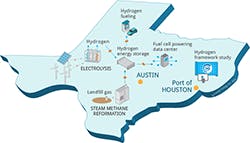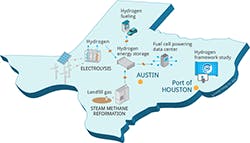Frontier Energy Launches DOE’s H2@Scale Project In Texas
The project is supported by DOE’s Hydrogen and Fuel Cell Technologies Office within the Office of Energy Efficiency and Renewable Energy.
Frontier Energy, Inc., in close collaboration with GTI and The University of Texas at Austin, launches a U.S. Department of Energy project, Demonstration and Framework for H2@Scale in Texas and Beyond. The project is supported by DOE’s Hydrogen and Fuel Cell Technologies Office within the Office of Energy Efficiency and Renewable Energy. H2@Scale in Texas and Beyond intends to show that renewable hydrogen can be a cost-effective fuel for multiple end-use applications, including fuel cell electric vehicles, when coupled with large, baseload consumers that use hydrogen for clean, reliable stationary power.
Frontier Energy is partnering with GTI, University of Texas at Austin, OneH2, Texas Gas Service, SoCalGas, Toyota Motor North America, Shell, Mitsubishi Heavy Industries, Air Liquide and PowerCell Sweden AB to conduct two related projects:
UT-Austin will host an integration of commercial hydrogen production, distribution, storage and use. The project partners will generate zero-carbon hydrogen onsite via electrolysis with solar and wind power and reformation of renewable natural gas from a Texas landfill. It is reportedly the first time that both sources of renewable hydrogen will be used in the same project. The hydrogen will power a stationary fuel cell to provide clean, reliable power for the Texas Advanced Computing Center and supply a hydrogen station with zero-emission fuel to fill a fleet of Toyota Mirai fuel cell electric vehicles.
At the Port of Houston, the project team will conduct a feasibility study for scaling up hydrogen production and use. The team will assess available resources, prospective hydrogen users and delivery infrastructure, such as existing pipelines that supply hydrogen to refineries. The study will examine policies, regulations and economics so that industry can develop a strategic action plan to present to policymakers to enable heavy-duty fuel cell transportation and energy systems.
“The Project H2@Scale in Texas and Beyond brings hydrogen industry leaders together with enthusiastic and important new participants to design, build and operate the first dedicated renewable hydrogen network. It will demonstrate infrastructure safety and reliability in a real-world situation,” says Nico Bouwkamp, Frontier Energy’s H2@Scale project manager. “The project will also leverage Texas’ extensive resources—wind power, solar energy, underground salt-dome storage formations, hydrogen pipelines, natural gas infrastructure, international port operations and a large, concentrated industrial infrastructure—to demonstrate the potential of DOE’s H2@Scale initiative.”
The project started on July 1, 2020 and will continue for three years. The project partners committed half of the funding for the $10.8 million project that will demonstrate how hydrogen production and use can enable grid resiliency, align domestic industries, increase competitiveness and promote job creation.
“EERE funding and leadership of this project are crucial to show that a resource-rich state like Texas can continue its role as a leading energy provider as the country transitions to renewables,” says Bouwkamp.
For more information, visit: www.frontierenergy.com

